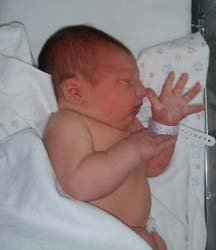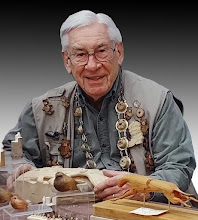The Slow Salvation of LukeHelping someone come to faith is sometimes maddeningly indirect.by David Hansen( from
http://www.ctlibrary.com/9632)
Debbie and I arrived home from our church meetings at 9 p.m. Flipping channels, hoping to unwind, we happened upon an old "Tennessee Ernie Ford Show" on PBS. He sat alone, on a bar stool, singing a cappella.
His wavy black hair and trim mustache stayed in place as his torso rocked and his fingers snapped to the rhythm of his backwoods renderings of songs about love and war. Then he told a tale.
"All the modern conveniences these days, I tell ya, they're really sumthin'—why, today, if you're cold at night, ya just turn up the heat on yer 'lectric blanket. Back home, when it got cold at night, ya brought yer hound dawg to bed with ya; and if ya didn't have a hound dawg, you got married."
He joked about President Kennedy paying off Frank Sinatra after the election, so the show must have aired before 1963. The camera angle widened and he stood on a stage with intermittent lights, grays and shadows. Dancers moved through the gray areas, harmonizing as he sang "Hang Down Your Head Tom Dooley." I smiled, amused and sentimental.
The lights brightened and the music cheered up as he invited his troupe of young ladies to perform. As they pranced around the stage, with everything's-wonderful smiles, that's when things got serious for me.
"Debbie, one of these young women was Luke's mom. Remember Luke? That big, cowboy-lookin' young man in Montana who died of AIDS?"
"Yes, I remember," she said.
"One of these ladies was Luke's mom . …" The young women frolicked as if their highest aspirations were well within reach, that is, to replace some guy's hound dog. Back-row attenderWhen Luke came to church, he sat in the folding chairs at the back of the sanctuary just below the stained glass windows. That way he could stretch his legs into the aisle between the chairs and back pew.
The windows faced east, so the light shimmered off Luke's thin, blonde hair parted down the middle. His face appeared dark in the shadow, but his thick mustache glowed in the light. He didn't sing. He watched. At times he'd place his elbows on his knees and put his head into his hands. Whether he was awake or asleep, I never knew. He would come a couple Sundays and then be gone for a month or two.
No one seemed to know him, except a young woman with four small children, who began attending about the same time. Sometimes they sat together.
One Sunday he invited me out to lunch. We talked about his work. He'd done a number of things but nothing for very long. Near the end of the meal he got to the point. He had two things on his mind. He wanted a family and he wanted peace with God. He'd gone to church as a kid, but after high school he'd spent 15 years pursuing sex and drugs and not much else. Now he wanted to settle down with a woman—and with God.
He asked for advice on his attachment to the young woman in church. Apparently she couldn't decide between him and another fellow who had lived the same kind of life. He told me that he had tried the Christian thing over and over, but it never stuck. He wanted to know that he was right with God. But he could not feel God's love.
I told him about God's love and His promise to forgive anyone who confesses, but nothing seemed to sink in. He continued to come to church sporadically.
Occasionally he came to my study to talk about love and Jesus. The conversations developed a predictable pattern. They started with his good questions and my dumb answers. When it became obvious I had nothing more to offer, his face got red and teary. Then he lost his temper.
"All I want is to have a normal family, with a wife and kids and peace with God," he cried. "Is that too much to ask? Why can't I have that? I'm so mad at God!" Then he would clench his fists and pound on his knees or shake them in air. "And you can't help me at all. You say you have answers, but nothing works." Then he would leave, slamming the door on the way out.
I don't think I ever gave him a single helpful comment. It frustrated both of us that the solutions that worked for others didn't work for him.
After several years of this, Luke called to make an appointment. I could tell from his voice that something was different this time.
"I need to tell you the truth," he said, "I have AIDS. I got it in Colorado when I was living in Steamboat, using every needle and sleeping with every girl I could get my hands on. I really need your help."
I calmly and clearly promised to be with him throughout his sickness. He needed to hear that, but he wanted to be healed. I promised to pray for him. He still wanted to marry the young lady. She knew about his illness, he assured me, and I believed him. I remember thinking at the time that his chances of getting healed of AIDS were better than marrying the young woman.
Through AIDS awareness programs, Luke began speaking to groups around the state about the dangers of unprotected sex and sharing needles. This did not mean, however, that he stopped having what he considered to be safe sex with various women in town. And his temper was only one of the reasons he could not sustain a relationship with a member of the opposite sex.
During one of his angry tirades, he shouted at me, "How can this Jesus thing work for me? You say God loves me. If he loves me, why doesn't he give me what I want? What do I have to do to please this Guy? He's impossible to deal with—"
This time, he'd pushed my hot button. "Well, for one thing," I said, "if you want to get right with God, you're going to have to stop going to bars in Bozeman for the express purpose of picking up women to have sex with them."
Luke sat without speaking, then cocked his head to the side and said, "Now how in the world am I supposed to stop doing that?"
No answer came to mind. Eventually I said, "I don't know."
He rose and left but he did not slam the door. Sad and angry, I wandered outside along the bank of a creek and prayed for him, and for myself. I realized he possessed no access to the meaning of my words.
I lost track of Luke for a few months, until I heard he was in the hospital with pneumonia. I visited him and prayed for him. He kept asking the same hard, angry questions. I was by no means the only person trying to help. His friends in AA spent far more hours with him than I did. The support personnel in the AIDS awareness programs were there for him. The young woman he loved was kind to him in many positive ways. I was the weakest link in his chain of friends.
Luke somehow got connected with a couple in their fifties who raised cattle and potatoes. They were Christian Reformed and Dutch as windmills. They loved Jesus and loved Luke. On weekends he worked at their ranch, running farm equipment. They fed him every Sunday afternoon and counseled him hour upon hour. They became his mom and dad. For all this, Luke made no discernable progress in his search for peace with God. Nothing we said made sense.
He was in and out of the hospital. How much time did he have? Would one of us be there at the right time for him, if and when such a time arrived?
The more disabled Luke became, the angrier he became. He said if God wouldn't heal him, he wanted nothing to do with God. But he couldn't stop talking about his need for resolution. When we met, I never had to raise the subject. Luke brought up God. He couldn't solve his spiritual problem, and he couldn't stop caring about it.
In some ways, his anger and fear were reasonable. The sicker he got, the more certain he became of what he had claimed all along; he did not know God and he was not saved. I agreed. And so did the Dutch couple.
But his fear could not save him; nor could we. As I took long walks praying for him, I faced the fact that Luke might never make the final commitment that makes all the difference. I felt helpless—but not hopeless.
His inability to close with Christ seemed less powerful than his inability to stop desiring divine closure.A Christmas breakDuring the fourth week of Advent, Luke entered the hospital for the last time. I felt sad for him on Christmas, so I drove to the hospital in the middle of the day. I entered the room and said hello, but he did not respond. He was watching his beloved Lakers play Christmas Day basketball.
I tried, intermittently, to make conversation, but he refused to acknowledge my presence. So I shut up, watched the game with him for a while, and left without a goodbye.
After the new year, Luke's health fell off a cliff. He lost pounds daily. They moved him to a hospice room. The young woman in church stayed with him hours at a time, caring for his bodily needs and kissing him. I kept showing up, with little to offer.
One of those days, I walked into the room and Luke looked up from his bed and said, "Okay, I'm ready, what do I have to do?"
"What?" I said incredulously.
"What do I have to do to get right with God?" he reiterated.
"You need to confess your sins and accept Jesus. Do you want to do that now?"
"Yep, I'm ready," he said confidently. So we closed our eyes, I prayed a sinner's prayer, and he repeated it. When I opened my eyes, his arms lay crossed on his chest, his eyes were still closed, and he sighed deeply and peacefully.
He opened his eyes: "I've got it now." And that was it. His anger was gone and he died a few days later.
For Luke's funeral his mother traveled from California. Her relationship with Luke had been so painfully strained for so many years that she had been unable to bear coming earlier. She was a kind lady, a widow, and devout in Christian faith. She loved Luke but had long ago accepted their estrangement. She told me their story.
"My husband and I adopted Luke," she said. "In the early 1960's my husband was a lawyer in the entertainment industry. We became good friends with the cast of the Tennessee Ernie Ford show, one couple in particular. She was a dancer. She became pregnant but didn't want the baby. So we agreed to adopt the child. Looking back, I realize that Luke's mother was an alcoholic. We had no idea at the time, but Luke had Fetal Alcohol Syndrome.
"Even as a small boy, Luke had a horrific temper. As he grew up, he never developed impulse control. Athletics got him through high school. After that he was a lost soul, unable to hold a job or sustain relationships. He took drugs, slept around, moved here and there. He showed up to ask for money. At first we tried to help him, but nothing was ever enough, so finally I had to cut him off."
Her husband had died of cancer, she said, and another adopted son had died of AIDS from homosexual contact.
I always walk away from funerals feeling a little numb; this one stunned me. All along, I'd wondered why Luke couldn't get his act together, why the spiritual breakthrough took so long.
Now I realized that Luke's brain, profoundly compromised in the womb, shackled him in many ways—including, perhaps, from all hope of realizing any of his dreams, except for ultimate peace with God. What took so long? Luke's disability did not excuse his behavior. But it certainly explained why it took him so long to come to terms with grace. The holes in Luke's brain did not prevent him from feeling guilt. But he had unusual difficulty making commitments on any level, with another human being or with God. He had Fetal Alcohol Syndrome. As perhaps did Tom Dooley. Both of them fit the profile.
The Scriptures provide us with moral standards for living, which represent God's holiness and our very life. In our ministries we rightly call people to conform to these standards, and we offer God's forgiveness and setting-right for new life in Christ. But how long is it supposed to take for these things to happen in any particular person's life? A moral absolute takes up no time or space. But all real human repentance, inspired by the Word and empowered by the Spirit, takes time.
We can read the Ten Commandments in a minute. But they don't come with performance timeframes like, say, the time allotted for a brake job. Today even medicine operates with time parameters for hospital stays and therapies.
Likewise, we want people to repent in what we consider a reasonable amount of time. But one of the great gifts of love we can offer people is the gift of time to repent in the context of their actual life, which includes abilities, disabilities, reasons, and problems we often know nothing about. Giving people time to repent is not the same as condoning sin, nor is it the same as lowering our standards to a level we think they can reach.
I never let up on Luke, but I never gave up on him. I never lowered the bar, but I never lowered the boom. Many times before an appointment, I rehearsed little speeches about how, until he changed his life, I did not want to see him again. I never used them.
Then again, Luke was never a member of our church, never held office. Giving time to brothers and sisters—especially those in leadership—can be more difficult. In many ways, the Scriptures are toughest on believers. John Calvin said, "No discipline, no church."
I believe that. I've asked people to leave churches, and I've asked church officers and teachers to step down. But most of us tend to be stricter with people we don't like and more patient with those we love.
That's partly what made my relationship with Luke so challenging. I felt compassion for him, but I didn't like him. Unless he was in the hospital, I never called on him. I didn't know where he lived until the last month of his life. Then again, he never told me. Perhaps because his relationships were so confused, he needed a relationship with someone without the threat of more confusion. I could offer him that. When he accepted Christ, it wasn't to please me. Nor had I arrived that day to please him. Our only bond was Divine Insistence.
In every case, before we pull the trigger on a relationship too quickly, we should recall how much time Jesus gave to people, particularly to his disciples: to those he loved and to the one who betrayed him. Jesus cut to the quick without cutting off. That is the gift of time. He gives us the gift of time because he knows how we are formed; he knows that we are dust, compromised by sins preceding our birth. Our slate is cracked and our chalk is soft.
If Moses had been slow to anger, God would not have had to etch the tablets twice. I'm sure I could not face knowing how many times my impatience has impeded God writing the commandments on people's hearts. I know this: my greatest failures as a pastor come when I forget how much I resist his engraving; and my greatest successes flow from giving to others the gift of time he gives to me.
David Hansen is pastor of Kenwood Baptist Church in Cincinnati, Ohio.Plucked from http://www.ctlibrary.com/9632











